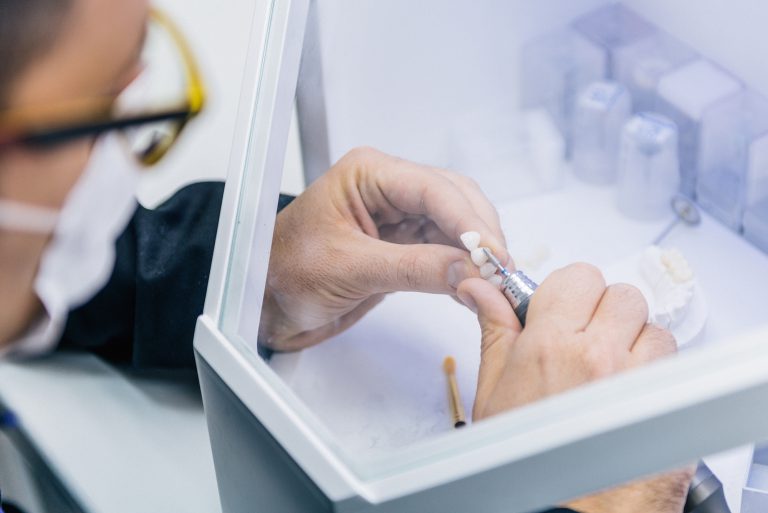
What Are Dental Implants?
Dental implants are metal screws used to replace missing teeth. During a simple surgical procedure, the dentist inserts the implant into the bone under your gums at the site of the lost tooth. This implant acts as a substitute for the natural tooth root and is completed with a restoration, like a dental crown, making it look and function like a natural tooth.
Choosing to get dental implants is an important decision. If you’re considering an implant but feel uncertain about the process, we offer a comprehensive explanation here. This information will help you understand what to expect and make a well-informed choice about your dental treatment.
Why You Might Need Dental Implants
Natural teeth are crucial for maintaining the height and shape of your smile, as well as enabling you to eat and speak with ease.
When you have a gap in your smile, your other teeth may start to move out of their correct positions, leading to oral health complications. The loss of just one tooth can initiate a series of changes that adversely affect your mouth’s health, your facial aesthetics, and your overall well-being.
Even if you don’t notice the immediate effects of missing teeth, there’s one inevitable issue: bone resorption. This natural process involves your body breaking down unused bone tissue to redistribute minerals elsewhere.
Without teeth, the bone tissue starts to deteriorate as it loses its function. Teeth in your jawbone promote bone density by encouraging new bone growth. This deterioration can lead to a receding jaw and chin, causing wrinkles and a hollow appearance in your cheeks and lips.
Dental implants are the next best thing to natural teeth. By replacing missing teeth with implants, you can prevent or correct the issues mentioned above.

The Benefits Of Dental Implants
A missing tooth can lead to a range of health issues and impact your self-esteem. It can make your bite feel awkward, create challenges when eating the foods you enjoy, and result in bone loss or teeth shifting. Losing a tooth can be a significant setback, making you feel self-conscious about your smile.
- Restore Your Natural Appearance – Dental implants are designed to look and feel just like your own teeth. Custom-made to blend seamlessly with your smile, they become permanent, “perfect” teeth. Implants appear natural because they are sized, shaped, and coloured to match your unique bite and the shade of your natural enamel.
- Feel Confident in Your Comfort – Once a dental implant is placed, your jawbone fuses with the titanium post as it heals. This integration ensures that the implant is secure, whether it’s topped with a crown, bridge, or used to anchor implant-supported dentures. You can laugh, smile, and enjoy your favourite foods without worrying about shifting teeth or sudden pain.
- Improve Bone Strength – Losing teeth can lead to the atrophy and weakening of the supporting bone over time. Dental implants stimulate new bone growth around the implant, helping to strengthen and maintain the bone structure.
Dental implants provide a natural-feeling, long-lasting solution that can endure for decades with proper oral hygiene.

Dental Implant Restorations
The visible part of a dental implant is the restoration, which is the artificial tooth that covers the implant. Although the implant itself is hidden beneath the gums, the restoration is what makes it look like you have a new, natural tooth when you smile.
- Dental Crown – This is the most common type of implant restoration, designed to cover a single-tooth implant.
- Dental Bridge – A bridge fills the space where multiple consecutive teeth are missing. It can replace several teeth using just one or two implants to support the bridge. A full implant-supported bridge can replace an entire arch of upper or lower teeth and is anchored by four or more implants.
- Implant Denture – Enhance the stability of a removable denture by securing it onto two small implants.

A New Life With Dental Implants Awaits!
After getting a dental implant, your smile will not only be restored but will look even better.
Caring for dental implants is straightforward. Simply brush and floss them gently every day, and take steps to protect them from injury during sports activities. Regular visits to our office will help us ensure your implant stays in great shape.
With proper care, your dental implant can give you many years of strong, confident, and beautiful smiles!
Start Today By Booking A Consultation
How It Feels
The procedure of inserting a metal implant into your jawbone is actually much more comfortable than it sounds. Despite how it might seem, the process is far less painful than you might expect.
We will use a mild anesthetic to numb your mouth, ensuring you feel no pain during the procedure. With advanced dental technology, we can place implants quickly, accurately, and with minimal invasiveness, resulting in less discomfort and shorter recovery time for you.
While the implant procedure only lasts about 30 minutes, some patients find themselves feeling bored or even drowsy. The most discomfort you might experience is simply having to keep your mouth open for a few minutes at a stretch.
After the procedure, it’s common to have some swelling, discomfort, and bruising for several hours. However, the pain is typically mild and easy to manage. We’ll provide you with detailed instructions to help minimize any discomfort before the anesthetic wears off. Your surgical implant site should start feeling better within a week.
You’ll be reassured to know that dental implants boast a success rate of nearly 95%. This makes getting an implant one of the safest and most predictable procedures in dentistry.

What To Expect On Your Dental Implant Treatment Journey
You may be pleasantly surprised to find that the actual implant placement process is far more comfortable than you might expect.
Assessment
Your journey begins with a dental implant consultation to determine if implants are suitable for you. During this visit, your dentist will conduct X-rays and a 3D cone-beam CT scan of your jaw to assess bone tissue and plan your treatment accordingly. The dental team will also take a scan or impression of your teeth to aid in planning the precise angulation of your implant.
Inserting the Implant
An anesthetic is administered to ensure complete numbness at the surgical site. Your dentist makes a small incision in both your mouth’s gums and bone. The implant post is placed in this hole by the dentist.
Finalizing the Restoration
After your implant heals over the next few months, you return to our practice. Here, we’ll have your dental restoration prepared and ready. The restoration will be placed, and you’ll leave with a brand-new, fully functional tooth.
Contact us today
to schedule an initial consultation & exam.
Your consultation will include an examination of everything from your teeth, gums and soft tissues to the shape and condition of your bite. Generally, we want to see how your whole mouth looks and functions. Before we plan your treatment we want to know everything about the health and aesthetic of your smile, and, most importantly, what you want to achieve so we can help you get there.
Cost Of Dental Implants In Whitby
In Whitby, the pricing for a single dental implant typically ranges from $3,000 to $6,000 or more. Full-mouth reconstruction with dental implants can vary significantly, starting at $6,000 and extending to $60,000 or higher. The cost for a complete set of dentures supported by implants averages approximately $30,000. Remember, precise pricing can only be determined after an in-person consultation, as the complexity of the procedure and individual factors influence the final cost.
- Type and Number of Implants: The number and type of implants required
- Materials and Supplies: The quality and type of materials used in the procedure
- Experience of the Dental Team: The skill and expertise of the dental professionals involved
- Location and Complexity: The geographical location of the practice and the complexity of the surgery
- Recovery Support: Post-surgical care and support provided during your recovery period
Several factors influence the cost of dental implant surgery:
To accurately assess your unique situation and offer different treatment options, it’s essential to consult with a dentist and undergo an oral exam. Every case varies, so we encourage you to schedule an appointment for a personalized evaluation. We’re here to provide an accurate quote tailored to your specific needs.
Are There Other Solutions for Missing Teeth?
For 1 to 3 missing teeth, a dental bridge may be suitable. In cases of extensive tooth loss on the top or bottom, or throughout the entire mouth, a dental prosthetic or removable dentures can be considered. When evaluating tooth replacement options, it’s important to carefully consider the pros and cons, including cost and effectiveness.
While dental implants may require a higher initial investment, they offer superior security and durability compared to bridges or dentures. Removable dental prosthetics require specific care and maintenance, often needing adjustments or replacements over time. In contrast, dental implants mimic natural teeth in care, requiring regular oral hygiene and dental check-ups. With proper maintenance, dental implants can provide a lifetime solution.
Frequently Asked Questions
Rest assured, no one will ever notice that you have dental implants—they seamlessly blend into your natural smile. The implants consist of discreet metal screws placed beneath your gums, topped with lifelike restorations that perfectly match your existing teeth.
When deciding between dentures and implants, it’s important to understand their distinct functions. Dentures sit atop your gums, exerting pressure on the underlying bone tissue. In contrast, implants provide enhanced bite strength as they are securely anchored beneath your gums. Each option presents unique advantages and considerations. For personalized advice tailored to your specific needs, we encourage you to visit us for an in-depth consultation.
Patients who may not be suitable candidates for dental implants often find dental bridges or full/partial dentures to be effective alternatives for replacing missing teeth. To explore the best solutions tailored to your needs, we invite you to schedule an appointment with us. We’re here to discuss all your options and address any questions you may have.
To be eligible for a dental implant, you must be an adult in good overall oral health. Your jawbone needs to be sufficiently strong to support the implant, and surrounding tissues, such as gums, must be healthy to minimize complications. If you’re unsure about your candidacy, contact us for a thorough evaluation. There are various treatment options available to restore oral health, including alternative solutions for replacing missing teeth.
Rest assured, your dental implants are designed to seamlessly blend with your natural teeth. Whether it’s a crown, bridge, or implant-supported dentures, each restoration is meticulously crafted to match the shape and colour of your existing teeth and align perfectly with your bite. Patients often find it challenging to differentiate between their natural teeth and their new, beautifully matched dental implants.
Advancements in dental implant technology have made the procedure highly predictable and relatively pain-free compared to its early days. Each step of the implant process is performed with meticulous care to minimize discomfort. With proper post-procedure care, you can anticipate minimal swelling and virtually no bleeding. Your well-being, both physical and emotional, is our priority. If you have any concerns or anxiety about your visit, please don’t hesitate to inform us.
For most patients, returning to work the day after implant surgery is feasible. Once we finalize your treatment plan, we’ll provide a more precise estimate and advise if additional time off is necessary. We ensure you receive thorough post-operative care instructions tailored to your specific needs.
The success and longevity of your implants depend on diligent maintenance. Regular professional cleaning and examinations are essential, akin to caring for natural teeth. Typically, we recommend check-ups every 6 months, but this schedule can be tailored to meet your specific oral health needs for optimal care.
To care for your dental implants, treat them like natural teeth: brush and floss regularly, schedule routine checkups, and promptly address any concerns with your dentist for optimal maintenance and longevity.
No, dental implants are designed to be a long-term solution and typically do not need to be replaced routinely. Once implanted, they are intended to remain stable and functional for an extended period.









